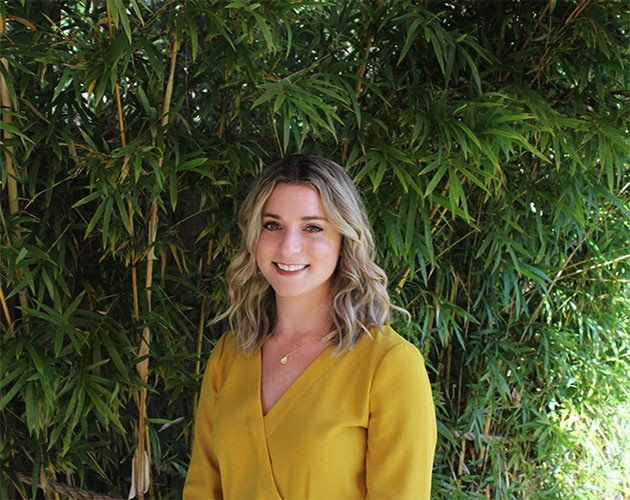Keep Calm and Trust Your Financial Instincts

In life, when things happen and you need to make a decision, being able to step back, assess and trust your gut instinct is important. So is knowing how to analyze situations, especially in financial circumstances, like you learn in the Certificate Program in Personal Financial Planning (PFP).
It was 1998. A friend whom Jacquelyn Murray had made shortly after earning a degree in business administration—with an emphasis in marketing and a minor in advertising—from Washington State University had also moved to the Bay Area and invited her to join an informal women’s investment club. A personal interest in understanding the financial markets and their long-term effects on personal finance was sparked.
“My parents and extended family weren’t investors,” Jacquelyn reflects. “They were entrepreneurs but they didn’t invest in the stock market; they re-invested their earnings back into the business to help it grow.”
The investment club not only allowed the financial newbie to grasp the basics, but it also informed her comprehension to be able to ride market fluctuations with tips that would eventually influence her current career path.
“Everything that I knew about the stock market, initially, I learned from our investment club,” she adds. “I had very little knowledge in financial planning or investment management prior to joining. I had had a small 401(k) in an employer plan, but other than that, I didn’t have any investments to speak of. I opened up my first brokerage account and began investing in individual stocks shortly after joining the club—you learn by doing. I have since invested in all of my employers’ 401(k) plans.”
Helping Others in Volatile Economic Climates
Jacquelyn also credits the investment club for showing her how to evaluate stocks and portfolios for her own personal investments and that of her family and friends.
“I believe Warren Buffett said, ‘Invest in the company, not the stock,’ or something along those lines,” she says. “And, ‘Buy what you know.’ Our current investment club portfolio is full of mostly widely known stocks, with a couple lesser-known ones.”
When asked how the club has helped lead her to a career in financial planning, she answers, “I don’t think I would be where I am today if it weren’t for our investment club. I think I’ve learned patience, mostly, and that you can never time the market. During the market fluctuations, I’ve learned to keep calm.”
This tip came in handy when the stock market experienced ups and downs in the late aughts. While her professional work was on business projects in the telecommunications industry with companies such as The Luster Group, WFINET, Velocitel (now owned by QualTek), T-Mobile and Southern California Edison, Jacquelyn continued to grow her knowledge base in how to invest in her overall future. Her project management skills and financial planning know-how was of importance on a personal level.
“I've been the ‘money guru’ among my family and friend groups,” she explains. “I’ve given general but very broad investing advice when asked.”
Related: Owning Your Financial Decisions
But it was a work colleague’s “suggestion” during the economic downturn in 2008 that struck a nerve. Jacquelyn knew from the investment club that she should ride the waves of the stock market. “A colleague tried to convince me to pull my 401(k) out of the market to lock in losses and put the funds into a safer money-market account,” she recalls.
“Fortunately, I had enough know-how to ignore his advice and keep dollar cost averaging every paycheck into my 401(k). I rode the 401(k) all the way down—close to a 45-percent loss—and all the way back out again because I didn’t sell.
“Not sure where I’d be today if I had listened to him. And I’m not sure when he got back into the market. You can’t time the bottom. Just keep swimming!”
After returning to Southern California for a time, Jacquelyn began mentoring as part of Big Brothers Big Sisters. While her involvement didn’t necessarily focus on aiding in financial goals, she did provide her “little sister” financial and loan advice when the topic was brought up.
“I see her whenever I’m down in SoCal,” Jacquelyn says. “We talk about many subjects, but one main topic is finance and money. She graduated with less than $15,000 in student loan debt, having received many merit scholarships and financial aid grants. She has squirreled away enough savings for an emergency fund and also invests in her employer’s 401(k) and an individual Roth IRA account. At 24, she is well beyond where I was investment-wise at her age. She is going to be quite successful, I have no doubt.”
Investing in Future Career Growth
As for furthering her own education, in 2010 while working in the Los Angeles area as a project manager, Jacquelyn completed a certificate in project management from UC Irvine Extension to enhance her skill set. Earning that certificate eventually allowed her to consider another continuing education opportunity—our Certificate Program in Personal Financial Planning.
“I began taking the PFP classes for personal enrichment; I had not planned to actually make a career change.”
However, life had a different idea.
“The telecommunications industry that I was in for most of my career was very stressful, high pressure, low appreciation and acknowledgement, and had unrealistic expectations and a high-level of burn-out,” she acknowledges. “I hit the proverbial wall at age 45.”
Because Jacquelyn was paying out of pocket for the classes when many of her peers were able to be reimbursed for continuing education through their employers, her motivation to register for the personal financial planning program was a little different.
“For many years already, I had subscribed to several blogs and podcasts, had read several books on personal finance and attended conferences such as FinCon on my own dime,” she says. “Personal finance was more of a hobby to me. I relished reading my textbooks from class. I knew a lot of the vernacular but had—and still have—so much that I’m learning.”
Once in the PFP certificate program, though, Jacquelyn was hooked. When asked which of the courses or instructors made the biggest impact on her career path and goals, she can’t pick a favorite.
“From the very first Survey of Personal Financial Planning course, all the way through the Personal Financial Planning Capstone, I enjoyed all of the courses for various reasons,” she says. “Remember, this started out as a personal enrichment or hobby exercise, and I ate it up. Not to say that it was easy—it was hard at times—but I really enjoyed it. Sometimes I think I missed my calling and should’ve started out in the financial services industry. But if I had, I don’t think that I’d be the same person who I am today.”
Stars Align at the Right Moment
In 2019, we hosted a personal financial planning career night that changed Jacquelyn’s career path. Through in-person networking at the event with academic staff, Jacquelyn met her future colleague—now supervisor—Laurent Harrison.
“I was completing the capstone course in the spring of 2020,” Jacquelyn recalls. “In January 2020, I interviewed at Bell Investment Advisors for a paraplanner role and began work in mid-February 2020. Then in March, the world shut-down due to COVID-19. I can’t believe the stars aligned and I was able to secure my job right before the lockdown.”
Not long after starting at the investment firm, Jacquelyn sat for the CFP® certification exam. She didn’t pass but learned what she needed to move forward with the experience.
“I was a little naive in thinking that I could maybe pass it on the first round without having much professional experience,” she admits. “I’m glad that I took it, but it probably would’ve been better if I didn’t take it in the middle of a global pandemic. Will I take the CFP® exam again? Likely. But I don’t have any immediate plans to do so. However, I am in the process of studying and completing the Series 65.”
“I began taking the PFP classes for personal enrichment.”
Carrying on is guidance Jacquelyn takes to heart. So is “just do it,” the advice Jacquelyn would give if asked whether the personal financial planning certificate is something a student should consider when in need of a career advancement—or even a later-in-life new career direction.
“It’s not too late,” she adds. “You’re not too old. Heck, I was 45 when I started the program and 48 when I made the career change. Almost four years in and I have no regrets. I’ve had a couple telecom industry recruiters reach out to me over the years, and I don’t think you could pay me enough to go back. I genuinely enjoy working with my colleagues and our clients. I couldn’t have landed at a more perfect firm for me. UC Berkeley Extension staff and fellow students helped me make this leap; I’m forever grateful for this experience.”
More than three years after making the career move, are the skills Jacquelyn acquired from the Certificate Program in Personal Financial Planning still helping her achieve her career and life goals?
Her short answer: “What skills am I not using? And I’m continuing to learn something new every day. It has been a whirlwind, but I’m so glad that I made the change when I did.”

